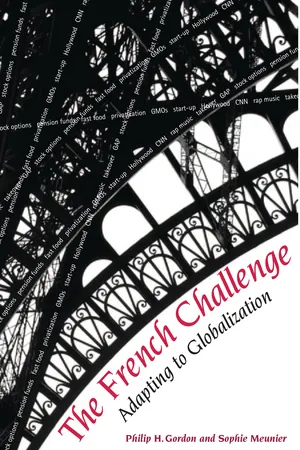
- 192 pages
- English
- PDF
- Available on iOS & Android
eBook - PDF
About this book
In August 1999 a forty-six-year-old sheep farmer name José Bové was arrested for dismantling the construction site of a new McDonald's restaurant in the south of France. A few months later Bové built on his fame by smuggling huge chunks of Roquefort cheese into Seattle, where he was among the leaders of the antiglobalization protests against the World Trade Organization summit.
Bové's crusade against globalization helped provoke a debate both within France and beyond about the pros and cons of a world in which financial, commercial, human, cultural, and technology flows move faster and more extensively than ever before. As the French struggle to preserve the country's identity, heritage, and distinctiveness, they are nonetheless adapting to a new economy and an interdependent world.
This book deals with France's effort to adapt to globalization and its consequences for France's economy, cultural identity, domestic politics, and foreign relations. The authors begin by analyzing the structural transformation of the French economy, driven first by liberalization within the European Union and more recently by globalization. By examining a wide variety of possible measures of globalization and liberalization, the authors conclude that the French economy's adaptation has been far reaching and largely successful, even if French leaders prefer to downplay the extent of these changes in response to political pressures and public opinion. They call this adaptation ""globalization by stealth.""
The authors also examine the relationship between trade, culture, and identity and explain why globalization has rendered the three inseparable. They show how globalization is contributing to the restructuring of the traditional French political spectrum and blurring the traditional differences between left and right. Finally, they explore France's effort to tame globalization—maîtriser la mondialisation—and the possible consequences and lessons of the French stance for the rest of the world.
Bové's crusade against globalization helped provoke a debate both within France and beyond about the pros and cons of a world in which financial, commercial, human, cultural, and technology flows move faster and more extensively than ever before. As the French struggle to preserve the country's identity, heritage, and distinctiveness, they are nonetheless adapting to a new economy and an interdependent world.
This book deals with France's effort to adapt to globalization and its consequences for France's economy, cultural identity, domestic politics, and foreign relations. The authors begin by analyzing the structural transformation of the French economy, driven first by liberalization within the European Union and more recently by globalization. By examining a wide variety of possible measures of globalization and liberalization, the authors conclude that the French economy's adaptation has been far reaching and largely successful, even if French leaders prefer to downplay the extent of these changes in response to political pressures and public opinion. They call this adaptation ""globalization by stealth.""
The authors also examine the relationship between trade, culture, and identity and explain why globalization has rendered the three inseparable. They show how globalization is contributing to the restructuring of the traditional French political spectrum and blurring the traditional differences between left and right. Finally, they explore France's effort to tame globalization—maîtriser la mondialisation—and the possible consequences and lessons of the French stance for the rest of the world.
Frequently asked questions
Yes, you can cancel anytime from the Subscription tab in your account settings on the Perlego website. Your subscription will stay active until the end of your current billing period. Learn how to cancel your subscription.
No, books cannot be downloaded as external files, such as PDFs, for use outside of Perlego. However, you can download books within the Perlego app for offline reading on mobile or tablet. Learn more here.
Perlego offers two plans: Essential and Complete
- Essential is ideal for learners and professionals who enjoy exploring a wide range of subjects. Access the Essential Library with 800,000+ trusted titles and best-sellers across business, personal growth, and the humanities. Includes unlimited reading time and Standard Read Aloud voice.
- Complete: Perfect for advanced learners and researchers needing full, unrestricted access. Unlock 1.4M+ books across hundreds of subjects, including academic and specialized titles. The Complete Plan also includes advanced features like Premium Read Aloud and Research Assistant.
We are an online textbook subscription service, where you can get access to an entire online library for less than the price of a single book per month. With over 1 million books across 1000+ topics, we’ve got you covered! Learn more here.
Look out for the read-aloud symbol on your next book to see if you can listen to it. The read-aloud tool reads text aloud for you, highlighting the text as it is being read. You can pause it, speed it up and slow it down. Learn more here.
Yes! You can use the Perlego app on both iOS or Android devices to read anytime, anywhere — even offline. Perfect for commutes or when you’re on the go.
Please note we cannot support devices running on iOS 13 and Android 7 or earlier. Learn more about using the app.
Please note we cannot support devices running on iOS 13 and Android 7 or earlier. Learn more about using the app.
Yes, you can access The French Challenge by Philip H. Gordon,Sophie Meunier-Aitsahalia in PDF and/or ePUB format, as well as other popular books in Politics & International Relations & European Politics. We have over one million books available in our catalogue for you to explore.
Information
Edition
1Subtopic
European PoliticsTable of contents
- Title Page
- Copyright Page
- Dedication Page
- Foreword
- Contents
- Chapter One: How Globalization Challenges France
- Chapter Two: The New French Economy: Globalization by Stealth
- Chapter Three: Trade, Culture, and Identity
- Chapter Four: Domestic Politics and Public Opinion
- Chapter Five: The French Response: Managing Globalization
- Notes
- Index